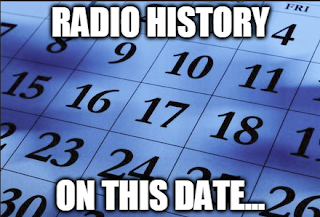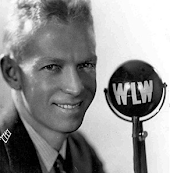 |
| Parker Fennelly |
He was a longtime member of Allen’s Alley on NBC’s Fred Allen Show, portraying Titus Moody with a strong “Down East” accent.
He was much in demand for numerous radio series based in New York, and over a 20 year span on various radio networks.
He died at age 96 on Jan. 22, 1988.
➦In 1939...the first televised pro football game airedfrom Ebbets Field in Brooklyn, New York. NBC’s flagship, W2XBS, carried the action. Brooklyn beat Philadelphia, 23-14. NBC later changed those experimental call letters to WRCA, and even later, to WNBC.
➦In 1961... In the midst of a growing “twist” craze, Chubby Checker was on CBS-TV’s Ed Sullivan Show, performing his original hit from the previous year, “The Twist,” along with his followup “Let’s Twist Again.” The resulting attention helped boost “The Twist” back to #1 by early 1962, marking the only time the same recording has hit the top spot on Billboard’s singles chart in two different years.
➦In 1969…Paul McCartney appeared in public to deny rumors of his death.
➦In 1986...NY Personality/Traffic Reporter Jane Dornacker died in a helicopter accident while working for WNBC 660 AM Radio in New York City (which became WFAN in 1988).
Dornacker was aboard during two unrelated crashes of the helicopters leased to WNBC. She survived the first crash, but was killed in the second crash into the Hudson River, which occurred as she was in the middle of a live traffic report.
Her death came shortly after that of her husband, Bob Knickerbocker, orphaning their 16-year-old daughter. The NTSB investigation determined the cause of the fatal crash to have been use of improper parts and poor maintenance on the part of Spectrum Helicopters of Ridgefield Park, New Jersey.
➦In 1992...Sportscaster Walter Lanier "Red" Barber died (Born - February 17, 1908). Barber, nicknamed "The Ol' Redhead", was primarily identified with broadcasts of Major League Baseball, calling play-by-play across four decades with the Cincinnati Reds (1934–1938), Brooklyn Dodgers (1939–1953), and New York Yankees (1954–1966). Like his fellow sports pioneer Mel Allen, Barber also gained a niche calling college and professional American football in his primary market of New York City.
 |
| Red Barber |
An agriculture professor had been scheduled to appear on WRUF, the university radio station, to read a scholarly paper over the air. When the professor's absence was discovered minutes before the broadcast was to begin, janitor Barber was called in as a substitute. Thus the future sportscaster's first gig was reading "Certain Aspects of Bovine Obstetrics".
After those few minutes in front of a microphone, Barber decided to switch careers. He became WRUF's director and chief announcer and covered Florida football games that autumn. Then he dropped out of school to focus on his radio work. After four more years at WRUF he landed a job broadcasting the Cincinnati Reds on WLW and WSAI when Powel Crosley, Jr., purchased the team in 1934.
On Opening Day 1934 (April 17), Barber attended his first major league game and broadcast its play-by-play, as the Reds lost to the Chicago Cubs 6–0. He called games from the stands of Cincinnati's renamed Crosley Field for the next five seasons.
Barber had been hired by Larry MacPhail, then president of the Reds. When MacPhail moved on to be president of the Dodgers for the 1939 season, he took the play-by-play man along. In Brooklyn, Barber became an institution, widely admired for his folksy style. He was also appreciated by people concerned about Brooklyn's reputation as a land of "dees" and "dems".In 1939 Barber broadcast the first major-league game on television, on experimental NBC station W2XBS. In 1946 he added to his Brooklyn duties a job as sports director of the CBS Radio Network, succeeding Ted Husing and continuing through 1955. There his greatest contribution was to conceive and host the CBS Football Roundup, which switched listeners back and forth between broadcasts of different regional college games each week.
For most of Barber's run with the Dodgers, the team was broadcast over radio station WMGM (later WHN) at 1050 on the AM dial.
Prior to the 1953 World Series, Barber was selected by Gillette, which sponsored the Series broadcasts, to call the games on NBC Radio Network along with Mel Allen. Barber wanted a larger fee than was offered by Gillette, however, and when Dodgers owner Walter O'Malley refused to back him, Barber declined to work the Series and Vin Scully partnered with Allen on the telecasts instead. As Barber later related in his 1968 autobiography, Rhubarb in the Catbird Seat, it was O'Malley's lack of support that led to his resigning from the Dodgers later that October.
Soon afterward the crosstown Yankees hired Barber. In 1955 he took his long-running television program Red Barber's Corner from CBS to NBC. It ran from 1949 until 1958.
Under the ownership of CBS in 1966, the Yankees finished tenth and last, their first time at the bottom of the standings since 1912 and after more than 40 years of dominating the American League. On September 22, paid attendance of 413 was announced at the 65,000-seat Yankee Stadium.
Barber asked the TV cameras to pan the empty stands as he commented on the low attendance. Although denied the camera shots on orders from the Yankees' head of media relations, he said, "I don't know what the paid attendance is today, but whatever it is, it is the smallest crowd in the history of Yankee Stadium, and this crowd is the story, not the game." By a horrible stroke of luck, that game was the first for CBS executive Mike Burke as team president. A week later, Barber was invited to breakfast where Burke told him that his contract wouldn't be renewed.
After his dismissal by the Yankees in 1966, Barber retired from baseball broadcasting. The National Sportscasters and Sportswriters Association inducted Barber into its Hall of Fame in 1973. In 1978, Barber joined former colleague Mel Allen to become the first broadcasters to receive the Ford C. Frick Award from the National Baseball Hall of Fame and Museum. In 1979, he was recognized with a Distinguished Alumni Award from the University of Florida, given a Gold Award by the Florida Association of Broadcasters, and inducted into the Florida Sports Hall of Fame. In 1984, Barber was part of the American Sportscasters Association Hall of Fame's inaugural class which included sportscasting legends Don Dunphy, Ted Husing, Bill Stern and Graham McNamee. Barber was given a George Polk Award in 1985 and a Peabody Award in 1990 for his NPR broadcasts, and in 1995 he was posthumously inducted into the National Radio Hall of Fame.
In 1993, TV Guide named Barber the best sportscaster of the 1950s
 |
| Sonny Taylor w/Chaka Kahn |
"He was a great jock and a tremendous programmer," says Bobby Jay then of WCBS-FM, whom Taylor convinced WNJR to hire from their alma mater, the School of Broadcasting and Announcing. "I remember his words," says Jay. "He said, 'Don't embarrass me!
Like many radio people, Taylor got around: St. Louis, Chicago, Miami. He spent the '90s at WMMJ in Washington, where he was working until he died.
➦In 2009...Milton Supman died from cancer (Born - January 8, 1926), known professionally as Soupy Sales, he was a comedian, actor, radio/television personality, and jazz aficionado. He was best known for his local and network children's television show Lunch with Soupy Sales (1953–1966), a series of comedy sketches frequently ending with Sales receiving a pie in the face, which became his trademark. From 1968 to 1975 he was a regular panelist on the syndicated revival of What's My Line? and appeared on several other TV game shows. During the 1980s, Sales hosted his own show on WNBC-AM in New York City.










































